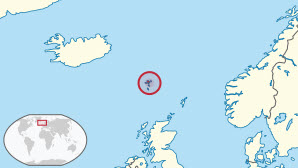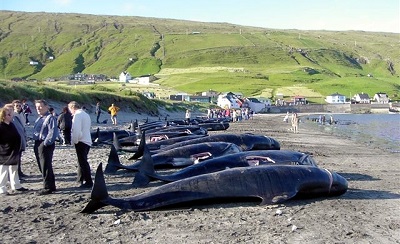Two Anti-Whaling Activists Arrested
Two volunteer crewmembers from the Sea Shepherd ship, Sam Simon, have been arrested in the Faroe Islands.
Susan Larsen of the United States, driver of the small boat, Farley, and Tom Strerath of Germany, navigator of the same small boat, were arrested at approximately 0900 local time on Tuesday.
 Sea Shepherd has issued a statement outlining its view of the incident:
Sea Shepherd has issued a statement outlining its view of the incident:
“Shortly before the incident, the Sam Simon and the Farley were investigating a flotilla of approximately 15 local boats that was on the move, heading north past Klaksvík. The Danish Navy vessel, HDMS Triton was also in the region.
“Though no pilot whales could be seen in the area by Sea Shepherd, the activity is generally indicative of a pilot whale drive hunt.
“Shortly after, the flotilla of boats stopped moving north, at which time the Sam Simon and the Farley also stopped moving.
“One of the small boats from the flotilla then approached the bow of the Sam Simon, moving southwards along the portside of the conservation ship, to its stern. The crew on board the small vessel threw a line in the propeller of the Sam Simon, intentionally disabling the Sea Shepherd ship.
“At this time, the Farley was approximately one nautical mile on the portside of the Sam Simon. It is understood that Faroese police boarded the small boat and arrested the two volunteers, and have since taken them to Klaksvík police station.
“Reports in local media indicate that local whale hunters had spotted and were attempting to drive a pod of pilot whales. However, it is believed that the pod escaped.”
Charges
Sea Shepherd has confirmed that both volunteer crewmembers are being charged under section (9) ‘Public Order Provisions’ of the Faroese Parliamentary Act No. 56 (the Pilot Whaling Act).
Section (9) states:
(1) Everyone who takes part in whaling at sea or on shore have [sic] a duty to obey requests, directions, order and prohibitions from a district administrator, a whaling foreman or another authorized person with powers conferred by the Parliamentary Act or an executive order issued under the authority of this Parliamentary Act to organize whaling and establish rules on public order in this connection.
(2) The provisions set out in subsection (1) moreover applies to persons who do not take part in the whaling as such but by their acts or failure to act, disturb, obstruct or prevent that the whaling may proceed as usual.
A court date has been set for this Thursday.
Food Culture

The hunts, called grindadráp in Faroese, are non-commercial and are organized on a community level. Anyone can participate, but special training is necessary to kill the whale with the spinal lance. The police and Grindaformenn are allowed to remove people from the grind area.
The hunters first surround the pilot whales with a wide semicircle of boats. The boats then drive the pilot whales into a bay or to the bottom of a fjord. Not all bays are certified, and the slaughter will only take place on a certified beach.
Many Faroese consider the hunt an important part of their food culture and history. Animal rights groups criticize the hunt as being cruel and unnecessary.
Whale Defense
Despite being an anti-whaling member nation of the European Union, subject to laws prohibiting the slaughter of cetaceans, Denmark continues to show its support for and collaboration with the Faroese whalers.
Sea Shepherd is currently in the Faroe Islands for its sixth pilot whale defense campaign, Operation Sleppid Grindini.
